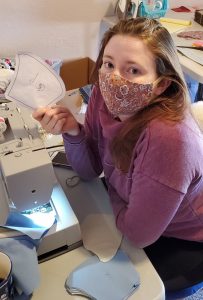
Carly Kimmins, costume shop manager, and her team of Wright State theatre students, including Sara Rice, a senior majoring in costume design, have been making cloth masks for health care workers and first responders.
The Dayton Fire Department has 100 of them. A Kettering hospice has 55. In all, 900 of them have been distributed in the area and 700 more are coming.
The personal protective masks to help guard against the spread of the coronavirus are being churned out by a regional team of mask-makers, including Carly Kimmins, Wright State University costume shop manager, and her small team of students.
They have been using their sewing machines to make the fabric masks for health care workers, first responders and others for weeks.
“This project is so Wright State: quiet, creative and providing critical support for the community and our students,” said Linda Caron, dean of the College of Liberal Arts. “Wright State’s heart is just incredible.”
A Wright State alumna, Kimmins joined the faculty in 2004 as manager of the costume shop in the Department of Theatre, Dance and Motion Pictures. She helps oversee theatre productions, maintains the storage of costumes and equipment, orders supplies and oversees students in costume production.
The mask-making effort is being spearheaded by Kathleen Hotmer, an adjunct faculty member in costume design and the costume shop manager for the theatre program at Sinclair Community College.
The project began in mid-March when Hotmer and Kimmins were asked to make some masks for social workers at South Community mental health center in Moraine.
“We decided it was a really good project to do for the community and also keep our students sewing,” said Kimmins. “When students were sent off campus, we couldn’t send production work with them. Any kind of sewing projects we can have them working on keeps their abilities going.”
All in-person classes at Wright State have been moved to remote delivery through the end of the spring semester and most classes through the summer semester to try to limit the spread of the coronavirus (COVID-19).
Kimmins said her students were feeling disconnected, lonely and uncertain. Making protective masks, she said, was a way to give them a feeling of power, control and giving back.
Kimmins loaned sewing machines to two of her mask-making students who live out of town in what was a social distancing handoff.
“They each parked five parking spaces away from me,” she said. “We formed a huge triangle in the parking lot, where I opened my trunk and stepped away from the car and they came and got a sewing machine.”
Kimmins and five of her students are making masks. So are Hotmer and her students and Zoe Still, an adjunct faculty member in design/technology in the Wright State Theatre Program.
The masks are made with sewing machines by using fabric, a pattern, and elastic or with ties. The fabric is washed so it shrinks, sewn into a mask, then rewashed and bagged by the glove-wearing mask-makers.
Many of the masks were made from leftover fabric in the costume shop.
“When we make costumes, we end up with all kinds of pieces that aren’t big enough for a whole costume but are too big to just throw away,” said Kimmins. “We have boxes and boxes of fabric remnants.”
It takes about 20 minutes to make a single mask. Kimmins makes about 25 a day.
“They are cotton fabrics,” she said. “Most of them are prints. They are all different colors and designs. Some of them are pleated.”
Kimmins and her team have provided 100 masks to the Dayton Fire Department, which is trying them out and hopes to get as many as 400. Grace Hospice in Kettering was supplied with 55 masks. Dynamic Senior Solutions health care received 25. Other people and organizations have each received 10 or 12 masks.
“They are surprisingly appreciative and overwhelmed,” said Kimmins. “They seem kind of surprised that people are helping them.”
Kimmins estimates that she and her team have made and distributed about 900 masks and have another 700 in the works.
“It is a way I can still be teaching and working with my students,” said Kimmins. “We’re just hoping to keep it going as long as there is a need. We’re hoping that it grows. The sky is the limit.”
The masks are being given away for free, but donations from the recipients are accepted.
“It helps you feel in control of something at a time when everything feels out of control,” said Kimmins. “I think it would be really easy to feel overwhelmed and anxiety-ridden and afraid. But when you wake up and have a purpose and a goal every day, it helps.”



 Wright State alum Lindsay Aitchison fulfills childhood space-agency dream
Wright State alum Lindsay Aitchison fulfills childhood space-agency dream  Wright State business professor, alumnus honored by regional technology organizations
Wright State business professor, alumnus honored by regional technology organizations  Wright State University Foundation awards 11 Students First Fund projects
Wright State University Foundation awards 11 Students First Fund projects  Gov. DeWine reappoints Board Treasurer Beth Ferris and names student Ella Vaught to Wright State Board of Trustees
Gov. DeWine reappoints Board Treasurer Beth Ferris and names student Ella Vaught to Wright State Board of Trustees  Joe Gruenberg’s 40-Year support for Wright State celebrated with Honorary Alumnus Award
Joe Gruenberg’s 40-Year support for Wright State celebrated with Honorary Alumnus Award 